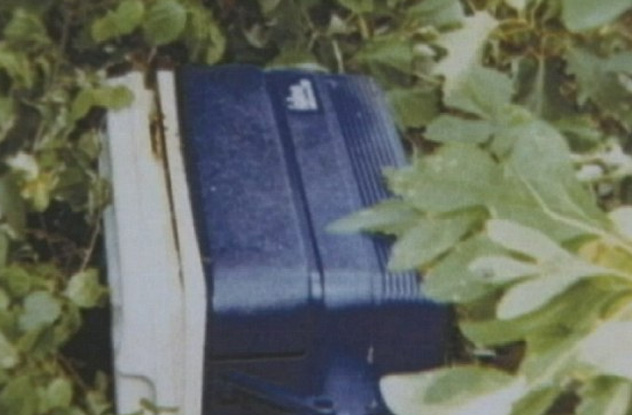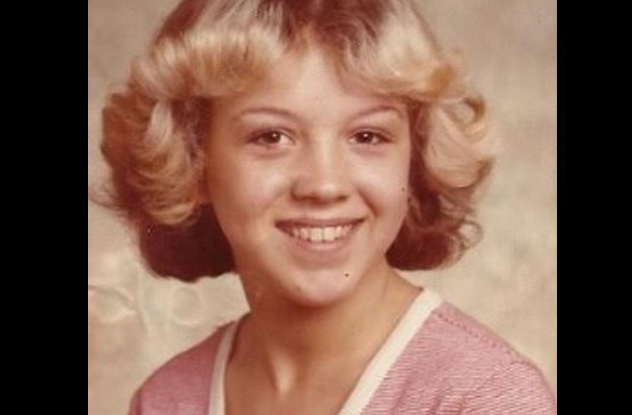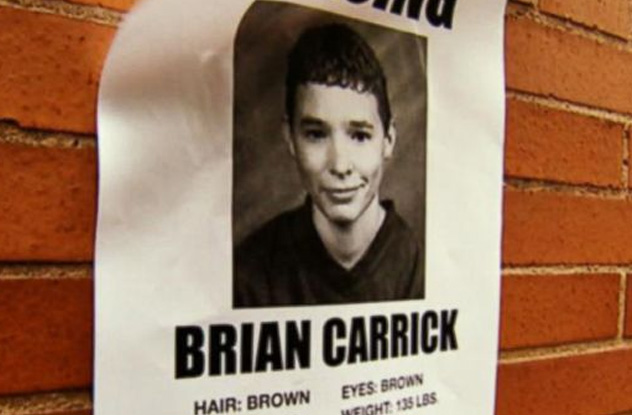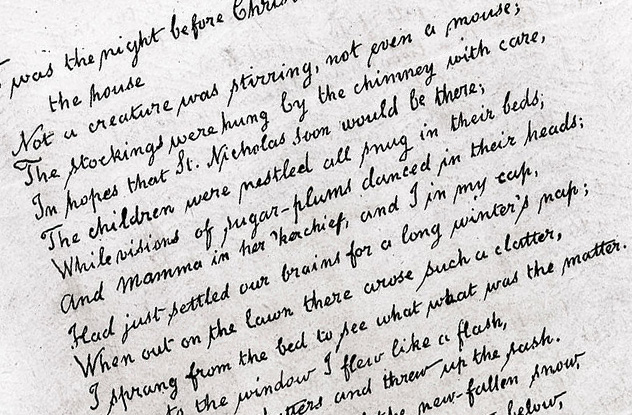 Food
Food  Food
Food  Movies and TV
Movies and TV 10 Shared TV Universes You’ve Likely Forgotten About
 Weird Stuff
Weird Stuff 10 of History’s Greatest Pranks & Hoaxes
 Miscellaneous
Miscellaneous 10 LEGO Facts That Will Toy with Your Mind
 Misconceptions
Misconceptions 10 Widespread Historical Myths and the Texts That Started Them
 Crime
Crime 10 Incredible Big-Time Art Fraudsters
 Movies and TV
Movies and TV 10 Most Influential Fictional Objects in Cinema History
 Our World
Our World Top 10 Real Almost‑Cities That Never Materialized
 Technology
Technology 10 Unsettling Ways Big Brother Is (Likely) Spying on You
 Music
Music 10 Chance Encounters That Formed Legendary Bands
 Food
Food 10 Modern Delicacies That Started as Poverty Rations
 Movies and TV
Movies and TV 10 Shared TV Universes You’ve Likely Forgotten About
 Weird Stuff
Weird Stuff 10 of History’s Greatest Pranks & Hoaxes
Who's Behind Listverse?

Jamie Frater
Head Editor
Jamie founded Listverse due to an insatiable desire to share fascinating, obscure, and bizarre facts. He has been a guest speaker on numerous national radio and television stations and is a five time published author.
More About Us Miscellaneous
Miscellaneous 10 LEGO Facts That Will Toy with Your Mind
 Misconceptions
Misconceptions 10 Widespread Historical Myths and the Texts That Started Them
 Crime
Crime 10 Incredible Big-Time Art Fraudsters
 Movies and TV
Movies and TV 10 Most Influential Fictional Objects in Cinema History
 Our World
Our World Top 10 Real Almost‑Cities That Never Materialized
 Technology
Technology 10 Unsettling Ways Big Brother Is (Likely) Spying on You
 Music
Music 10 Chance Encounters That Formed Legendary Bands
10 Sudden Developments In Mysteries We’ve Been Following
Here at Listverse, some of the most popular articles with our readers cover mysteries. We’ve covered thousands of mysteries since the site began, but a unique phenomenon has recently been taking place. Over the past 18 months, a surprisingly large number of mysteries featured here have either been solved or had major developments. What’s even more remarkable is that some of these mysteries were cold cases which had been unsolved for decades. If nothing else, these stories show that Listverse might be a good luck omen when it comes to unsolved mysteries.
10The Disappearance Of The McStay Family

For nearly four years, no missing persons case was more baffling than the disappearance of the McStay family. On February 4, 2010, Joseph McStay, Summer McStay, and their two children, four-year-old Gianni and three-year-old Joseph Jr., all mysteriously vanished from their home in Fallbrook, California. Days later, their abandoned vehicle was found near the Mexican border. A review of surveillance footage found a family resembling the McStays walking across the border. For a while, authorities leaned toward the theory that the McStays had disappeared voluntarily. Unfortunately, the abandoned vehicle and the surveillance footage turned out to be nothing more giant red herrings.
On November 11, 2013, human remains were discovered in two shallow graves in a remote desert area outside of Victorville. Dental records positively identified the remains as the McStay family. Their cause of death was believed to be blunt force trauma, and it’s likely that the family was murdered inside their home before their bodies were transported to the desert and buried.
Nearly one year to the day after the remains were discovered, police finally announced that they had made an arrest. Charles “Chase” Merritt was charged with the McStay family murders. Merritt had been Joseph McStay’s business partner and received a call from Joseph’s cell phone on the same night the family disappeared. It is believed that he abandoned the McStays’ vehicle near the border to throw police off the trail. Merritt is currently awaiting trial for the murders.
9The Disappearance Of The Jamison Family

Four months before the disappearance of the McStays, Oklahoma had its own baffling missing persons case involving an entire family. Bobby Jamison lived in the town of Eufaula with his wife, Sherilynn, and their six-year-old daughter, Madyson. On October 8, 2009, the Jamison family mysteriously disappeared from their home. Their abandoned pickup truck was later found on a rural dirt road outside the town of Red Oak. The family dog was locked inside the vehicle and nearly died of starvation. The Jamisons had reportedly driven out to the area to purchase a plot of land, and $32,000 in cash was found underneath the front seat. Bobby and Sherilynn had been displaying bizarre behavior prior to their disappearance, and there were rumors that the family was involved in drug dealing, so numerous theories surrounded this case.
Remarkably, the disappearances of both the McStay and Jamison families were solved in the exact same week. On November 16, 2013, only five days after the discovery of the McStays, hunters found human remains in a wooded area nearly 5 kilometers (3 mi) away from where the Jamisons’ pickup truck had been abandoned. There were no signs of foul play, but the remains appeared to belong to two adults and a child. Months later, the remains were positively identified as Bobby, Sherilynn, and Madyson Jamison. However, the cause of death for the family has yet to be determined, and the circumstances of what actually happened to the Jamisons remain shrouded in mystery.
8The Murder Of Baby Hope

On July 23, 1991, a cooler was discovered alongside the Henry Hudson Parkway in New York City. When the cooler was opened, everyone was shocked to find the decomposed body of a young girl inside. The cause of death was asphyxiation, and the girl had been sexually abused prior to her death. Over a week before the discovery, a witness had seen a Hispanic couple walking alongside the Parkway with a cooler. Since the child’s identity was unknown, authorities appealed to the public for information. They received no answers, so for over 20 years, the unidentified girl was simply known as “Baby Hope.”
During the summer of 2013, the Baby Hope case was reopened and re-publicized. Shortly thereafter, authorities received information leading them to a woman named Margarita Castillo, who claimed that her four-year-old daughter, Anjelica, had gone missing two decades earlier. According to Margarita, Anjelica’s father had taken off with the child in 1991, but she was never reported missing. DNA samples extracted from Baby Hope’s body were compared with Margarita’s DNA, and they proved to be a perfect match.
In October, the investigation led to Margarita’s cousin, Conrado Juarez, a 52-year-old dishwasher from Manhattan. After being questioned by police, Juarez confessed to sexually abusing Anjelica before smothering her to death. With the help of one of his sisters, he then placed the child’s body in a cooler and left it alongside the Parkway. Juarez was indicted for the murder and is currently awaiting trial. After 22 years, Baby Hope was finally laid to rest under her real name, Anjelica Castillo.
7The Caledonia Jane Doe

On November 9, 1979, the body of a teenage girl was found in a cornfield outside Caledonia, New York. She had been murdered with two gunshots to the head but carried no identification. Witnesses had reported seeing her hitchhiking the night before she was discovered. An analysis on microscopic pollen grains inside her clothing determined that these grains originated from another state, so the girl had traveled from elsewhere to arrive in New York. However, a thorough investigation turned up no answers about the girl’s identity or her killer. For over 35 years, the teenage victim was simply known as “Jane Doe.”
In January 2015, the Caledonia Jane Doe was finally identified as Tammy Jo Alexander, a 16-year-old runaway from Brooksville, Florida. The identification was set in motion when one of Tammy’s former high school classmates tried to track her down. To the classmate’s surprise, Tammy’s sister informed her that she had not been seen since the late 1970s. Even more surprisingly, no missing persons report existed for Tammy Jo Alexander. Tammy had a history of running away from her tumultuous home, so she was either not reported missing by her family or the police simply wrote her off as a runaway and refused to file the report.
In 2014, Tammy was officially reported missing, which caught the attention of Carl Koppelman, a member of the Internet group Websleuths. Koppelman thought that Tammy bore a striking resemblance to forensic sketches of the Caledonia Jane Doe and reported this information to police. DNA testing would conclusively determine that they were the same person. Tammy Jo Alexander’s killer has still never been identified.
6The Unidentified Grateful Dead Fan

On June 26, 1995, a unique mystery was born in Greensville County, Virginia after a van crash claimed the life of a motorist named Michael Eric Hager. The crash itself was nothing more than a tragic accident, but it also claimed the life of a young male hitchhiker in the passenger’s seat. The man carried no identification, but since he was wearing a Grateful Dead Anniversary Tour T-shirt and had a ticket stub from a recent Grateful Dead concert, he would be nicknamed “Grateful Doe.” He also carried a note from two unidentified women addressed to someone named “Jason.” In spite of these intriguing clues, all attempts to identify the young man went nowhere.
In January 2015, Grateful Doe’s story was shared on the website Imgur. A user saw a sketch of Grateful Doe and thought he resembled a former acquaintance: a young Grateful Dead fan named Jason, who just seemed to disappear in 1995. When photos of this Jason were posted online, his resemblance to Grateful Doe was striking. The “Jason” in the photographs was soon identified as Jason Patrick Callahan, whose mother lived in Myrtle Beach, South Carolina.
When questioned, Jason’s mother confirmed that she had not been in contact with her son since 1995. She never filed a missing persons report because Jason traveled around a lot and lived a nomadic lifestyle, so she didn’t know with which jurisdiction to file the report. DNA testing is currently underway to determine if Grateful Doe and Jason Callahan are the same person, but many people are convinced they will be a perfect match.
5The Wrongful Conviction Of Ryan Ferguson

For nine years, many people believed that Ryan Ferguson was serving time in prison for a crime he did not commit. In 2001, when Ferguson was 17, he spent Halloween night partying at a bar in Columbia, Missouri. Later that evening, a man named Kent Heitholt was murdered a few blocks away. Heitholt worked as a sports editor for the Daily Tribune and was beaten and strangled to death with his own belt in his workplace’s parking lot. In 2004, Chuck Erickson, a friend of Ryan Ferguson’s, confessed to police that he and Ferguson both murdered Heitholt after leaving the bar that night. Even though Erickson’s confession was filled with inconsistencies, he agreed to testify against Ferguson in exchange for a reduced sentence of 25 years. Ferguson was found guilty of murder and was sentenced to 40 years in prison.
Years later, Erickson recanted his confession. A witness who testified that he saw Ferguson and Erickson running away from the murder scene also recanted his story, claiming he had been pressured by the prosecution. Since there was no other evidence tying Ferguson to the crime, his supporters lobbied for his release. Kathleen Zellner, an attorney notable for overturning wrongful convictions, appealed the case.
On November 5, 2013, the Missouri Court of Appeals vacated Ferguson’s conviction, and he was released from prison one week later. Ferguson has since filed a federal civil rights lawsuit and become an advocate for the wrongfully convicted. Even though Ryan Ferguson is now a free man, Chuck Erickson is still incarcerated for a crime he likely had nothing to do with, and Kent Heitholt’s murder remains unsolved.
4The Disappearance Of Brian Carrick

On December 20, 2002, 17-year-old Brian Carrick mysteriously vanished from his place of employment, the Val’s Foods market in Johnsburg, Illinois. Traces of Carrick’s blood were found in the store, suggesting that he met with foul play. Years later, one of Carrick’s coworkers, Shane Lamb, confessed that both he and Carrick’s supervisor, Mario Casciaro, had murdered Carrick in the store’s produce freezer after a dispute over a drug debt. In exchange for immunity, Lamb agreed to testify against Casciaro at his trial. In November 2013, Mario Casciaro was convicted of Brian Carrick’s murder and was sentenced to 26 years in prison.
Brian Carrick’s remains have still never been found, but new developments now suggest that Mario Casciaro might be an innocent man. In October 2014, mere weeks after Carrick’s story was published on Listverse, it was announced that Shane Lamb had recanted his story. He now claims that neither he nor Casciaro had anything to do with Carrick’s murder.
Mario Casciaro is currently being represented by Kathleen Zellner, the same attorney who secured Ryan Ferguson’s release from prison. Zellner has turned the investigation toward Robert Render, another employee who worked at Val’s Foods at the time of Carrick’s disappearance. Even though no physical evidence has ever linked Casciaro to the crime, DNA testing has confirmed that some of the blood found in the produce freezer belonged to Robert Render. Render died of a drug overdose in 2012, but Zellner is lobbying for more DNA testing and hopes to exonerate Mario Casciaro.
3The Disappearance Of Kyle Peterson

On February 20, 2014, 29-year-old Kyle Peterson was driving through the town of Troutdale, Oregon and crashed his SUV into a guardrail. When police arrived at the scene, Peterson admitted that he had been looking at his cell phone when the accident occurred. However, everything seemed perfectly normal until Peterson suddenly snapped without warning. He climbed back into his SUV and revved the engine. Peterson then climbed out of the vehicle, ran into the nearby woods, and vanished. A search of the area turned up no trace of him.
The article featuring this story was published on Listverse on July 16, 2014. Incredibly, the mystery of Kyle Peterson would be solved only two days later. On the afternoon of July 18, the body of a young man was found floating in the Sandy River, approximately 6 kilometers (4 mi) away from the original accident scene. The body was positively identified as Kyle Peterson.
It’s theorized that Peterson might have suffered some sort of concussion in the accident and behaved erratically when he didn’t receive the proper medical treatment. Officially, foul play has not been suspected in Kyle Peterson’s death, but the actual circumstances of what happened are still unknown.
2The Origin Of ‘Twas The Night Before Christmas’

The famous Christmas poem, “Twas the Night Before Christmas,” was originally published in Troy, New York on December 23, 1823 under the title “A Visit from St. Nicholas” after an anonymous writer sent it in to the local newspaper, The Sentinel. For years, no one knew the identity of the writer until a professor named Clement Clarke Moore took credit in 1844. However, centuries later, some historians started leaning toward the idea that Moore was not the actual writer. They presented compelling evidence that the real poet might have been a Poughkeepsie farmer named Henry Livingston Jr., who died 16 years before Moore took credit for writing the poem.
Shortly after this story was written for Listverse, a major development took place before the list was even published on the website. In 2013, the town of Troy held a mock trial to determine whether Clement Clarke Moore or Henry Livingston Jr. wrote “Twas the Night Before Christmas.” Evidence was presented for both sides, but the proceedings ended in a hung jury, and the issue remained unresolved. As a result, funds were raised via Kickstarter to hold another mock trial the following year. The end result was surprising.
On December 7, 2014, a jury of two men and four women ruled that Henry Livingston Jr. was the likely author of “Twas the Night Before Christmas.” Obviously, the trial was done purely in good fun, and the ruling had no legal weight, but it has added more credence to the belief that Livingston should receive credit for one of the most famous poems of all time.
1The Identity Of Suzanne Davis/Sharon Marshall/Tonya Dawn Tadlock

When a young Oklahoma woman died in a hit-and-run accident in April 1990, investigators uncovered a truly twisted mystery. For years, the young woman lived under several different aliases, including “Suzanne Davis,” “Sharon Marshall,” and “Tonya Dawn Tadlock.” She was raised by a career criminal named Franklin Delano Floyd, and they were married once she reached adulthood. However, DNA testing showed that the woman was not Floyd’s biological daughter. Even stranger, she had given birth to a boy named Michael, but Floyd was not his biological father, either. After Michael was put in foster care, Floyd abducted him in 1994. He was later arrested, but Michael has never been found. Floyd was sent to death row for another unrelated murder but remained silent about the deceased girl he raised as his daughter.
This bizarre story was chronicled in the book A Beautiful Child, and its author, Matt Birkbeck, worked tirelessly to uncover the girl’s identity. In October 2014, Birkbeck announced that she had been positively identified as Suzanne Marie Sevakis.
During the 1970s, Suzanne lived in North Carolina with her divorced mother and three siblings. Suzanne’s mother eventually got remarried to Franklin Delano Floyd. In 1975, when Suzanne was six years old, her mother was sentenced to serve 30 days in jail for a minor crime. While she was incarcerated, Floyd took her four children and fled the state. Two of the children were dropped off at a social services agency, but Suzanne’s younger brother was never recovered.
For the next 15 years, Floyd raised Suzanne as his own daughter and constantly abused her until her death in 1990. In 2014, Floyd finally opened up about his marriage to Suzanne’s mother. After the woman was tracked down and identified her missing daughter in a photograph, DNA testing confirmed her identity as Suzanne Marie Sevakis.
Robin Warder is a budding Canadian screenwriter who has used his encyclopedic movie knowledge to publish numerous articles at Cracked.com. He is also the co-owner of a pop culture website called The Back Row and recently worked on a sci-fi short film called Jet Ranger of Another Tomorrow. Feel free to contact him here.








